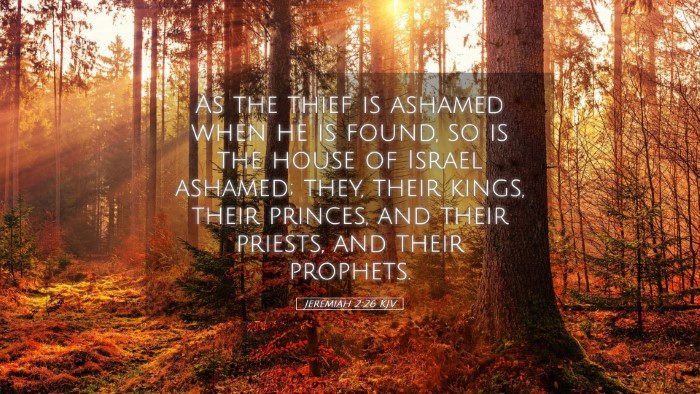Commentary on Jeremiah 2:26
Jeremiah 2:26 states, "As the thief is ashamed when he is found, so is the house of Israel ashamed; they, their kings, their princes, and their priests, and their prophets." This verse provides a vivid metaphor for the shame and disgrace associated with Israel's actions, revealing deep insights into the spiritual condition of the nation.
Context and Background
In the broader context of Jeremiah's prophetic ministry, this verse is part of a larger discourse where God, through Jeremiah, chastises Israel for their unfaithfulness. The chapter outlines Israel's departure from God, highlighting the consequences of idolatry and spiritual infidelity.
Historical Context
Israel's history is marked by cycles of rebellion and repentance, and during Jeremiah's time, the nation had strayed significantly from their covenant relationship with God. The use of the imagery of the thief conveys a sense of being caught in wrongdoing, stimulating reflection on the nature of sin and its shameful consequences.
Key Elements of the Verse
- Thief's Shame: The shame referenced illustrates the natural response of someone caught red-handed. This analogy serves to symbolize Israel's guilt when confronted with their iniquities.
- Collective Guilt: The mention of "their kings, their princes, and their priests, and their prophets" indicates that the corruption spans all levels of society, from leadership to religious institutions. This highlights a comprehensive failure rather than isolated instances of sin.
Insights from Commentators
Matthew Henry
Matthew Henry notes that the shame of a thief, when found, resonates with the way Israel feels publicly exposed in their sins. He emphasizes the holistic nature of their guilt: it involves not just the people but also those in positions of authority who have failed to lead the nation correctly. Henry's reflections point to a universal truth regarding the soul's response to being discovered in wrongdoings.
Albert Barnes
Albert Barnes elaborates on the concept of shame, interpreting it as both a present feeling and a future consequence. He stresses that the acknowledgment of guilt is a critical step toward repentance. Barnes also digs deeper into the implications of leadership failure, indicating that when leaders abandon their moral and spiritual responsibilities, the entire community suffers. His insights call for a serious introspection about the role of leaders in spiritual matters.
Adam Clarke
Adam Clarke expands the theme of shame by linking it to the idea of a broken covenant. He asserts that the shame of Israel is not merely about being caught; it signifies a profound disconnection from their God. Clarke invites readers to reflect on the seriousness of abandoning divine ordinances and stresses the importance of returning to foundational beliefs and practices.
Theological Reflections
This verse serves as a crucial reminder of the nature of sin and its impacts on individuals and communities. The thief’s shame is not only about the act of theft but encapsulates the broader reality of sin and its uncovering.
- God's Justice: The imagery underscores God's justice—He sees and ultimately addresses sin, leading those who are unrepentant to experience shame.
- Human Response: The juxtaposition of the thief's shame and Israel’s guilt can prompt believers today to consider how they respond when called to account for actions contrary to God’s will.
Application for Today's Believers
For pastors, students, and theologians, Jeremiah 2:26 offers profound lessons on accountability and the consequences of sin within both individual and corporate contexts. The historical backdrop combined with the metaphor of shame encourages a more serious engagement with personal and communal faith practices.
- Self-Examination: Individuals and church leaders are called to self-examine their lives and ministries, ensuring they align with God's statutes and integrity.
- Community Accountability: The verse emphasizes the importance of accountability within communities of faith, urging believers to support each other in righteous living.
Conclusion
In conclusion, Jeremiah 2:26 is a stark reminder of the consequences of turning away from God and the collective shame that follows. Through the insights of public domain commentators, we derive a richer understanding of our responsibilities as followers of Christ and the need for continuous vigilance against the subtle encroachments of sin.


